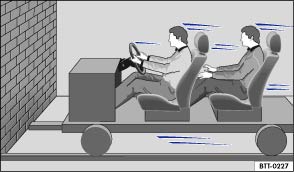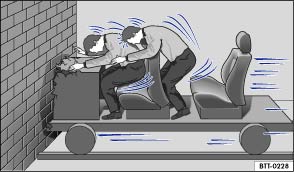Volkswagen Touran Owners Manual: Frontal collisions and the laws of physics

Fig. 52 Passengers of a vehicle heading for a brick wall. They are not wearing seat belts

Fig. 53 A vehicle with unbelted occupants strikes the wall
 First read and observe the introductory information
and safety warnings
First read and observe the introductory information
and safety warnings The physical principles involved in a frontal collision are relatively simple. Both the moving vehicle and the passengers possess energy, which is known as kinetic energy.
The higher the vehicle speed and the greater the weight of a vehicle will mean that more energy will have to be released in an accident.
The most significant factor, however, is the speed of the vehicle. If the speed doubles from 25 km/h to 50 km/h (15 mph to 30 mph), for example, the kinetic energy increases by a factor of four.
The amount of kinetic energy depends on the speed of the vehicle and the weight of the vehicle and passengers. The higher the speed and the greater the weight, the more energy there is to be released in an accident.
Passengers not wearing seat belts are not attached to the vehicle. In a frontal collision they will continue to move forward at the speed their vehicle was travelling just before the impact, until something stops it! Because the passengers in our example are not restrained by seat belts, the entire amount of kinetic energy has to be absorbed at the point of impact .
Even at speeds of 30 km/h (18 mph) to 50 km/h (30 mph), the forces acting on bodies in a collision can easily exceed one tonne (1,000 kg). At greater speed these forces are even higher.
This example applies not only to frontal collisions, but to all accidents and collisions.
 Warning lamps
Warning lamps
Fig. 51 Warning lamp in the
instrument cluster
First read and observe the introductory information
and safety warnings
Lights up or flashes
Possible ...
 What happens to passengers who have not fastened their seat belts?
What happens to passengers who have not fastened their seat belts?
Fig. 54 A driver not wearing
a seat belt is thrown forward
Fig. 55 The unbelted rear
passenger is thrown forward violently, hitting the driver wearing a seat belt
First read and observe the i ...
Other materials:
Volkswagen Touran Owners Manual. Warning lamps and indicator lamps
The warning and indicator lamps indicate a number of warnings , faults or
different functions. Some warning and indicator lamps light up when the ignition
is switched on and should go out once the engine is running or the vehicle is in
motion.
Depending on the vehicle's equipment leve ...
Volkswagen Touran Owners Manual. Interior and reading lights
First read and observe the introductory information
and safety warnings
Button / Position
Function
Switches off the interior
lights.
Switches interior lights on.
Switches door contact switch on ( ...
